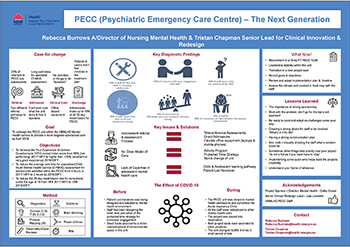To redesign the Psychiatric Emergency Care Centre (PECC) unit within the Nepean Blue Mountains Local Health District (NBMLHD) Mental Health service to provide a more targeted specialised care by April 2020.
- To improve the consumer experience and care when admitted to the PECC Unit.
- To improve services for the adolescent population when admitted to an adult inpatient facility.
Aim
- To increase the Your Experience of Service Questionnaire (YES) overall index score from 68% (not performing) 2017/18FY to higher then >75% (excellent or very good experience) 2019/20FY.
- To reduce the average wait time for specialised Child Youth Mental Health. Service (CYMHS) assessment for adolescents admitted within the PECC from 4 hours in 2017/18FY to 2 hours by 2019/20FY.
- To reduce the 28 day readmission rate for consumers under the age of 18 from 18% 2017/18FY to >3% 2019/20FY.
Benefits
- Improved patient safety with trauma informed and recovery orientated care.
- Improved wellbeing outcomes for people with a mental illness.
- Allocating patient to the right service at the right time.
- Direct consumer and carer participation in service planning and evaluation.
- NBMLHD Mental Health clinical staff will be more engaged in consumer focused co designed mental health care.
- Strengthen service partnerships.
- Improved patient flow practices.
Program dates
- February 2019 – project planning.
- April 2019 – Initiation.
- May 2019 – Diagnostics.
- July 2019 – Solution Design.
- September 2019 – Development of implementation plan.
- October 2019 – Commencement of first solution.
- February 2019 – Commencement of second solution.
- March 2020 – Project placed on hold.
Status
Pre-implementation - Planning for the project is well underway. Clinician and consumer consultation has occurred but no solutions have been developed.
Background
- Currently Nepean Blue Mountains Local Health District (NBMLHD) Mental Health service does not have a specialised adolescent inpatient service. This results in adolescents being admitted to the adult Psychiatric Emergency Care Centre (PECC) unit whilst awaiting a specialised bed outside the Local Health District.
- Although inpatient psychiatric care is often only required for a small proportion of adolescents, frequently admission options are only available to adult units such as the PECC. (Curran, et al., 2011). Admissions to these adult facilities can pose many difficulties such as removing adolescents from their strong social supports, such as family and school, while it also being a frightening and a traumatic experience. Adolescents will often report a sense of boredom during these admissions due to these units being unable to provide suitable age specific activities and resources. (Park, McDermott, Loy & Dean, 2011).
- Adult inpatient staff such as those that work in the PECC also have concerns about the safety and vulnerability of adolescents being exposed to the adult inpatient mental health environment. A study by Park, McDermott, Loy & Dean, 2011 found that staff felt they lacked resources, skills & training in age specific behaviour and developmental needs of adolescents to provide appropriate care.
- The risk of adolescents receiving a poor experience whilst admitted in an adult unit may lead to aversion from seeking mental health care in the future and lead to poor engagement with health services. The PECC provides an opportunity to deliver coordinated adolescent care as the unit environment allows for little exposure to adult consumers while focusing on a quick return to an adolescents social supports within the community.
Implementation
Issue 1
An outdated Model of Care that does not meet consumers’ needs or guides staffs practice.
Solution 1
Development of a new Model of Care for the Psychiatric Emergency Care Centre (PECC) Unit which includes specific processes for care & interventions of adolescents in the adult inpatient unit- PECC. There will be clear inclusion and exclusion criteria.
Issue 2
Consumers not having control of their treatment/care plan. Empowering the consumers voice.
Solution 2
Patient led handover is a process that empowers consumers to communicate what matters to them. It lays the foundations for consumers and staff and build a therapeutic relationship while giving consumers a greater voice in their care.
Issue 3
Not having time to engage in therapeutic activities between staff and consumers.
Solution 3
Protected engagement time allows for a quarantined period every day where administrative activities and visits are stopped so that there can be a dedicated focus on therapeutic interventions.
Implementation sites
Nepean Blue Mountains Local Health District Mental Health Service ((NBMLHD) ) – Psychiatric Emergency Care Centre (PECC).
Partnerships
- Centre for Healthcare Redesign
Results
Due to the global health pandemic COVID-19, the project was placed in hiatus. The project was not at a stage to be able to review results or undertake any formal evaluation.
Lessons learnt
- The importance of strong sponsorship.
- Stick with the problem, don’t go for the band aid approach.
- Be ready to pivot and adapt as challenges come your way.
- Creating a strong desire for staff to be involved “What’s in it for Me”.
- Having a strong communication plan.
References
- Curran, G., Walter, G., Soh, N., Herman, M., Baker, M., & Paton, M. et al. (2011). Staff Experience, Knowledge and Attitudes Regarding the Management of Adolescent Patients in Adult Mental Health Units. Australasian Psychiatry, 19(5), 420-425. doi: 10.3109/10398562.2011.602079.
- Park, C., McDermott, B., Loy, J., & Dean, P. (2011). Adolescent Admissions to Adult Psychiatric Units: Patterns and Implications for Service Provision. Australasian Psychiatry, 19(4), 345-349. doi: 10.3109/10398562.2011.601311.
Contacts
Rebecca Burrows
A/Director of Nursing Mental Health
NBMLHD MH Service
Phone: 02 4734 1912
Rebecca.Burrows@health.nsw.gov.au
Tristan Chapman
Senior Lead for Clinical Innovation & Redesign
NBMLHD MH Service
Phone: 02 4734 1912
Tristan.Chapman@health.nsw.gov.au
